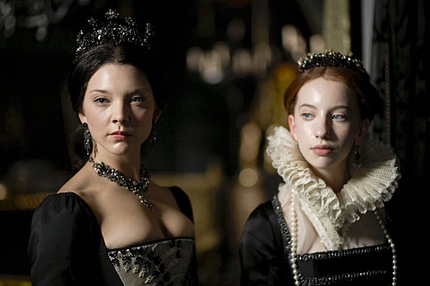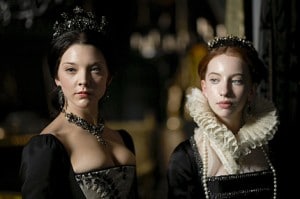A Great Impact on History

 The impact that Anne Boleyn’s life and death had on history can be viewed in two ways – by the short-term impact that Anne’s life and death had on the contemporary history of the Tudor age, and the long-term effect that it has had on world history in the centuries since her execution.
The impact that Anne Boleyn’s life and death had on history can be viewed in two ways – by the short-term impact that Anne’s life and death had on the contemporary history of the Tudor age, and the long-term effect that it has had on world history in the centuries since her execution.
At the time of Anne’s birth, she was considered to be so insignificant that nobody saw fit to record the event – no one knows the date or the month of her birth, and even the year is disputed by historians, with 1501 being the year accepted by most, although some believe that she was born in 1507. May 19, 1536 – the date of her execution – is one that is remembered by historians and laypeople alike as the date of the first execution of a queen of England. I would imagine that most English people who were alive in 1536 would remember exactly where they were and what they were doing when they heard that the “Great wh*re” had been beheaded after being found guilty of charges of treason, adultery and incest – just like most Americans alive at the time remember what they were doing on December 7, 1941, when Pearl Harbor was attacked; on November 22, 1963 when President John F. Kennedy was assassinated, on August 31, 1997 when Princess Diana died, or on September 11, 2001, when the World Trade Center was attacked.
May 19, 1536. One wonders whether Anne herself had any idea that people would still remember the significance of the date nearly 475 years in the future. Of course she realized the impact that she had on contemporary history – that her husband had once loved her so passionately that he was willing to break from the Roman Catholic Church, make bitter enemies of the Pope and the Holy Roman Emperor, and risk excommunication in order to make her his queen. Of course, Anne did not exist in a vacuum; if little Henry, Duke of Cornwall, firstborn son of Henry VIII and Katherine of Aragon, had survived to adulthood instead of living a scant 52 days in 1511, Henry VIII would have most likely remained married to Katherine of Aragon. Anne Boleyn might then have just been a footnote in history, like Bessie Blount or her own sister Mary Boleyn, as one of Henry’s mistresses. It is just as likely that Anne’s name would have been lost in the mists of time, her being married off to her cousin, James Butler, or to some equally socially acceptable young man in a match intended to benefit her family.
As Anne stood on the scaffold at the Tower of London on that fateful day, she might have wondered if the 35 years since her unrecorded birth had been in vain – all she had to show for her long relationship with and marriage to the king was a baby daughter, Elizabeth, not yet 3 years old, and several miscarriages, the most recent having taken place the previous January. Anne would probably have seen the irony in the parallels between her life and Katherine’s – if only either woman had a son who had lived, she would have been infallible. Elizabeth had been declared a bastard like her elder half-sister Mary, so her future was far from certain. No one – least of all Anne – would have known that Elizabeth would prove to be her mother’s greatest legacy. For Elizabeth, despite the fact that she called herself the “Lion’s Cub” and took great pride in meeting foreign dignitaries while standing before a portrait of her father, was also very much her mother’s daughter. Although she had the red hair of the Tudors, Elizabeth had Anne Boleyn’s beautiful black eyes, long oval face and long, slender, tapering fingers. More importantly, she possessed her mother’s intelligence, bravery and firey personality. Just as Anne had held the powerful Henry VIII at bay for 8 long years, Elizabeth defied her council when they insisted that she marry, since the general belief at the time was that a woman was unfit to rule, especially without a husband making the decisions for her. Elizabeth was astute enough to realize that if she married a foreign prince, as her half-sister Mary had done, England would have become a satellite of her husband’s empire, weakening England’s status as a world power and culminating in the resentment of her subjects. If, on the other hand, she married for love, as her father had done several times, it would have caused competition and resentment among the nobility, affecting the balance of power of the Court. It was in her daughter’s decision never to marry, ironically, that the fate of Anne Boleyn most adversely affected history, both contemporary and long-term. Obviously, if Elizabeth had a son, there wouldn’t have been the concern during her lifetime regarding the succession. For posterity, the outcome of the great Elizabeth I never bearing an heir resulted in the end of the powerful Tudor dynasty after a mere five monarchs. If Elizabeth had married the man of her choice – and all signs point to Robert Dudley as being that man – perhaps they would have had a son or daughter to continue the Tudor line. Although a male heir would have been much preferred by the Tudor population, Elizabeth herself had proven to the world that a woman could successfully reign over a world power, paving the way for future queens, such as Victoria and Elizabeth II, to reign in their own right. The failure of Elizabeth I to give birth to a child of her own leaves a great “what if” in English history – would the would-be heir (or heiress) have continued the “Golden Age” of his (or her) grandfather and mother, or would the Tudor dynasty have only existed for another generation or so under a weak monarch? Elizabeth’s reluctance to marry is completely understandable considering her mother’s fate. Her father loved her mother so passionately that he was willing to move heaven & earth in order to marry her – only to sign her death warrant within 3 years. This, along with the fate of her half-sister and 2 of her stepmothers, must have alerted Elizabeth to the dangers of passion. History does not record at what age Elizabeth found out about the circumstances of her mother’s death, the way in which is was revealed to her, or her reaction to the revelation. It is fair to speculate, however, that Elizabeth didn’t view the “happily ever after” scenario with rose-colored glasses.
Thus, the life and death of Anne Boleyn had a great impact on history. In all likelihood, Henry VIII would not have broken from the Roman Catholic Church if it hadn’t been for his love of Anne, affecting the way that the people of Great Britain worship to this day. More importantly, the life and death of Anne Boleyn had its greatest impact on her greatest legacy, her daughter Elizabeth. If Anne had never been born, history would never have known the great Queen Elizabeth I. Unfortunately, the tragic manner of Anne’s death most likely contributed to Elizabeth’s aversion to marriage and in Elizabeth’s failure to marry and have children, resulting in the extinction of the Tudor line.
by Nancy Smith